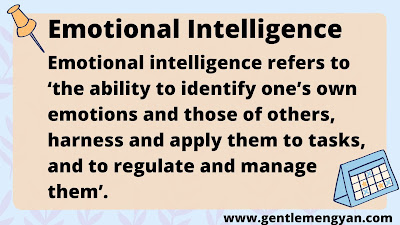Emotional Intelligence UPSC | Ethics | GS-4
Emotional Intelligence (Ethics) | UPSC
Topic: GS Paper - 4 Ethics and Human Interface | Emotional intelligence
"Anybody can become angry, that is easy; but to be angry with the right person, and to the right degree, and at the right time, and for the right purpose, and in the right way, that is not within everybody’s power, that is not easy." —Aristotle
What is Emotional Intelligence (EI) ?
The term was coined by two researchers – Peter Salovey and John Mayer in 1990 however it went popular in 1996 from Daniel Goleman’s book ‘Emotional Intelligence: Why It Can Matter More Than IQ’.
Emotional Intelligence:
Emotional intelligence refers to ‘the ability to identify one’s own emotions and those of others, harness and apply them to tasks, and to regulate and manage them’.
Emotional Quotient (EQ) is a measure of one’s EI i.e. through a standardized test, one’s awareness of emotions in relation to self and others is known.
Four Different Areas of EI (Mayer & Salovey Ability Model)
- The ability to perceive emotions in oneself and others accurately.
- The ability to use emotions to facilitate thinking.
- The ability to understand emotions, emotional language, and the signals conveyed by emotions.
- The ability to manage emotions so as to attain specific goals.
Elements of EI (as given by Daniel Goleman)
Self-Awareness:
It is the skill of being aware of and understanding one’s emotions as they occur and as they evolve.
Self-Regulation:
It is about controlling one’s emotions i.e. instead of reacting quickly; one can reign in one’s emotions and thus will think before responding.
Internal Motivation:
It includes one’s personal drive to improve and achieve commitment to one’s goals and initiatives, or readiness to act on opportunities, and optimism and resilience.
Empathy:
It is an awareness of the needs and feelings of others both individually and in groups, and being able to see things from the point of view of others.
Social Skills:
It is applying empathy and balancing the wants and requirements of others with one’s. It includes building good rapport with others.
Emotional Quotient (EQ) vs. Intelligent Quotient (IQ)
The Intelligence Quotient is a measure of a person's intelligence in numbers. Emotional intelligence (EI) is the ability to understand, control, and quantify emotions. While some academics claim that emotional intelligence is an innate quality, others think it can be taught and developed.
A standardized "intelligence" examination yields a score known as the Intelligence Quotient (IQ). The Emotional Quotient (EQ), measures your capacity to recognise, regulate, evaluate, and express your emotions.
"What really matters for success, character, happiness and lifelong achievements is a definite set of emotional skills – your EQ — not just purely cognitive abilities that are measured by conventional IQ tests." —Daniel Goleman
| Emotional Quotient (EQ) | Intelligent Quotient (IQ) |
|---|---|
| EQ is a measure of a person's level of emotional intelligence. It refers to a person's ability to perceive, control, evaluate, and express emotions. | IQ is a score derived from one of several standardized tests designed to assess an individual's intelligence. It is used to determine academic abilities and identify individuals with off-the-chart intelligence or mental challenges. |
| EQ is centred on abilities such as identifying emotions, evaluating how others feel, controlling one's own emotions, perceiving how others feel, using emotions to facilitate social communication and relating to others. | IQ represents abilities such as visual and spatial processing, knowledge of the world, fluid reasoning, working memory and short-term memory and quantitative reasoning. |
Importance of Emotional Intelligence (EI) in Civil Services
1. For Targeting Policies better:
Bureaucrats need to know emotions, moods and drives of persons at whom public policy is targeted for better acquaintance with the nature of problems in society and their possible solutions.
An empathetic individual can read emotional currents, picking up on nonverbal cues such as tone of voice or facial expression, thereby better understanding the needs and demands of other people and acting accordingly.
2. For motivating subordinates:
EI helps a person in comprehending emotions of others, thus an emotionally intelligent civil servant can motivate his/her subordinates towards a particular goal.
3. Stress Management:
EI enables one to manage emotions in anxiety-provoking situations and thus helps one in maintaining her/his physical and mental well being.
4. For change:
An Emotionally Intelligent person is more likely to try new things, take risks and face new challenges without fear. This will help in finding innovative solutions to different problems.
5. For Decision making:
EI helps in recognising such emotions that are unrelated to any specific problem and not allowing them to be influential to the final result.
It allows mental clarity that leadership demands for taking right decisions and deal with conflicting situations rationally.
Ex. IAS Durga shakti Nagpal had raided sand mafias because of her motivation towards service due to EI even when her life could be at stake.
6. For Better Communication:
An Emotionally Intelligent civil servant will be able to communicate policies in a better manner. Also, the person will be able to foster a healthy relationship with subordinates.
7. For maintaining balance in life:
EI helps a civil servant in managing his/her personal life as well as professional life.
On personal front, EI makes one more flexible, empathetic and clear in expression.
8. For Adaptation:
It also helps one to appreciate new culture, understand local customs and traditions etc.
9. For Evaluation:
EI enables a leader to be conscious of personal limitations and use personal strengths to further the work of achieving organizational goals.
It helps in developing healthy working relationships by better understanding the strengths and weaknesses of co-workers and maintaining a healthy rapport with people.
10. Persuasion:
It helps an administrator to persuade, convince, or impact others in order to get them to support a specific agenda or course of action.
Relevance of EI in Civil Services
Civil Servants today face numerous problems in the work environment such as:
- Increasing regional, economic and digital divide.
- Widespread application of Information Technology (IT).
- Demand for improved governance.
- Issues getting politicised easily.
- Political Pressure and Rampant Corruption.
- Decentralisation of governance to grassroot levels thereby increased responsibilities.
- Issues of globalisation, migration, terrorism, cybercrimes, information technology etc.
Improving Emotional Intelligence
- By self-evaluating oneself, one can know one’s emotions and reactions to different situations.
- By observing others, one can comprehend feelings of others.
- By improving one’s expression, one can communicate better.
- By analyzing the impact of one’s actions over others, one can fine tune the actions.
- Now-a-days, organizations take initiatives to improve Emotional Intelligence among their employees through different group activities, exercises, seminars and tests. However, EI also improves with age (maturity) due to one’s experiences in life.
Rule Your Feelings, Lest Your Feelings Rule You. — Publilius Syrus
Undesirable Negative Emotions
In 1972, Paul Eckman suggested that there are six basic emotions that are universal throughout human cultures: fear, disgust, anger, surprise, happiness, and sadness.
These emotions are found in their different degrees and intensities in different people.
A civil servant is a person with varied tasks and responsibilities. She has to perform her functions and obligations sometimes in extreme conditions. In these circumstances it would be a general instinct in any person to submit to the situation and let the emotions dictate your actions.
The acts done under the control of a negative emotions may lead to disastrous consequences. Hence a civil servant needs to be emotionally firm and composed. She should be able to manage and avoid Negative Emotions.
Animosity, attachment, aversion, selfishness, arrogance, jealousy, greed, hypocrisy, malice and similar emotions should never drive public servants’ actions.
While doing her/his duties, she/he should ensure that her/his mind remains serene and composed.
They should not be obsessed with anxieties about success or failure, happiness or misery, victory or defeat, profit or loss and glory or humiliation which actions may bring about.
Public servants should not get unduly buoyed up by success or overly depressed by failure. They should learn to take such things in their stride.
Human beings, by their very nature, tend to be selfish. But public servants should sublimate selfish propensities by directing them towards service to man and society.
Religious Intolerance: They should not be motivated by religious fundamentalism and favour a particular religion but should be religiously tolerant.
Do not feel dejected by failures: Anyone should not opt out of the challenges of personal and social life. They should not fall into escapism or seek false anodynes. Ideas like divine will or destiny should not be used as pretexts for inaction.
Men cannot know divine will. They have to perform their duty without thinking about other matters.
A civil servant without EI:
Disregard for Values :
In the absence of EI, the civil servant may not respect values like impartiality, non-partisanship, tolerance and secularism in his/her working environment. She/he may fall an agent to a particular ideology, political party, or religion.
The recent acceptance of political office (Rajya Sabha's M.P.) by the ex. CJI Ranjan Gogoi, just after his retirement as a CJI had brought criticism about the impartiality and nonpartisanship among the civil servants as a whole.
Failure in balancing public vs private life :
An emotionally intelligent civil servant is better able to balance public life and personal life. In the absence of EI he may become inefficient, corrupt and dissatisfied with the service.
Crisis of conscience :
A non-EI civil servant may not manage the conflicts between his/her own emotion and the Rule of Law. It will lead to lack of reasonableness and law of proportionality in the decision making.
Ex. Building a wall on the road to prevent the public's movement in the first wave of covid-19. It is unreasonable because it also prevents emergency movement of the vehicle for security, health and other purposes.
Understanding of Interest:
A civil servant without EI may harm both his/her own interest and public’s amid office politics.
It is said that one Japanese is less than one Indian but two Japanese is too much than two Indians. It shows the effectiveness of EI among Japanese in particular and teamwork in general.
Relationship building:
EI together with Aptitude brings emotional quotients that enrich both personal and professional relations.
For more dynamic, motivated, service oriented and disciplined civil servants EI is sine-qua-non. In the era of hybrid mode of working the application of EI is immense for perfect goal realisation of the public.
Role of EI in Handling Mob Protest & Violence:
Keeping Things Under Control:
Mob protests can get out of control within a matter of a few minutes, an emotionally incompetent administrator will be incapable of keeping things under control.
Being calm and composed:
In highly intense environment surrounded by a mob one can easily freak out. It is the emotional Intelligence which can keep you calm and composed in such extreme situations.
Dealing With Self Emotions:
One tend to engulfed by emotions like Anger and anxiety in troublesome situations. These emotions are almost never helpful in any circumstances, especially when one’s dealing with mob protests.
Building communication:
To pacify a mob a civil servant has to understand the emotions involved and act accordingly. An emotionally intelligent civil servant can strike the communication at the earliest.
Avoid Impulsive behaviour:
Humans are emotion driven beings. When things get out of control their acts become guided by emotions. In the heat of a moment such emotions may lead to impulsive behaviour, which is a strict no in mob handling.
Negotiating With the Mob:
In order to control a mob, you need to be charismatic, confident, and approachable. You need to be able to keep a cool head, even when everyone around you is in panic mode.
Social responsibility:
As administrator, it is the primary responsibility to care about all the stakeholders and keep everyone in the loop.
Q. A public servant must need to control his emotions. Discuss the undesirable negative emotions he should refrain from. (150 Words)
Approach
In the introduction, write in brief about the emotion and their effects.
Discuss the undesirable negative emotions that public servants should refrain from.
Conclude suitably giving some measures to manage negative emotions.
Q. Consider the function of emotional intelligence in the diverse context that exists for an administrator. Also identify the primary characteristics that an emotionally intelligent administrator should possess, Examine with examples. (150 words)
Approach
Briefly define emotional intelligence (EI).
Identify the role of EI for an administrator.
Enumerate the key attributes that an emotionally intelligent administrator should imbibe.
Give a conclusion.
Q. Situations have meaning because of emotions. Without emotions, one would respond to situations in an automatic and uncontrolled way. Discuss the many facets of emotional intelligence and emphasize its significance for civil servants in light of this assertion. (150 words)
Approach
Begin by defining Emotional Intelligence and then mention its various components, like self-awareness, self-regulation etc.
Highlight the role of EI for Civil Servants by taking into account the intricate nature of governance.
Conclude by referring to broader objectives of EI.
Q. Discuss the significance of emotional intelligence in dealing with mob demonstrations and violence. (150 words)
Approach
Start the answer by briefly defining the term emotional intelligence.
Discuss the role of EI in handling mob protest & violence.
Conclude Suitably.
Q. People with ordinary Intelligent Quotient (IQ) surpass those with higher Intelligent Quotient more frequently. The reason for this is emotional intelligence (EQ). Illustrate. (150 words)
Approach
Give a brief introduction about Intelligence Quotient (IQ) and Emotional Intelligence (EI).
Explain the importance of Emotional Intelligence in association with Intelligence Quotients.
Give a fair conclusion.
Q. Emotional Intelligence is defined by observations based on feelings. Elaborate (150 Words)
Approach
Start your answer by defining emotional intelligence and mention how it is based on feelings.
Mention the significance of emotional intelligence in the life of an individual.
Mention how it can be improved.
Conclude your answer by highlighting the importance of emotional Intelligence.
Q. Why is there a greater need than ever for civil servants to have emotional intelligence? (250 Words)
Approach
Introduce Emotional intelligence.
Briefly discuss how emotional intelligence helps civil servants and lack of it brings number of conflict-of-interest situations.
Conclude suitably.
Introductions for Answers:
1. Emotional intelligence refers to the capability of a person to manage and control his or her emotions and possess the ability to control the emotions of others as well.
2. The term ‘Emotional Intelligence’, first coined by psychologists Mayer and Salovey (1990), refers to one’s capacity to perceive, process and regulate emotional information accurately and effectively, both within oneself and in others and to use this information to guide one’s thinking and actions and to influence those of others.
Conclusions :
1. The civil servant as an administrator has the responsibility to act as the vanguard of society. In this context, utilization of emotional intelligence skills can assist him\ her in the attainment of this goal and enhance the quality of decision-making, deal with complex situations effectively.
2. Emotionally intelligent civil servants are likely to lead to a saner democracy as well. In fact, EI has been considered by some as the third stage after “courtesy” and “civility”, in the progress of democracy. EI concentrates on the experience aspect of democracy. It compels people to treat each other as humans and not just roles.
3. Thus, Intelligence quotient alone can’t solve the majority of problems an administrator faces, use of emotional intelligence is a must for better public service delivery as well as redressal.
4. Civil servants form relations beyond the official mandate and make things done in the interest of the public by effective, productive and positive office politics. It is possible only through the application of EI.

.jpeg)

.jpeg)
.jpeg)

.jpeg)




Comments
Post a Comment
Your Views and Comments means a lot to us.